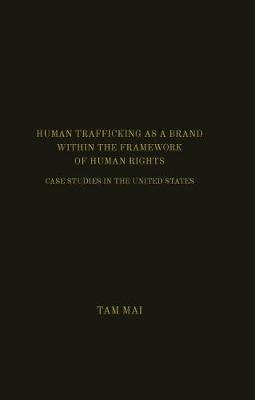
Human Trafficking As A Brand Within The Framework of Human Rights
Case Studies in the United States
Seiten
2017
Academica Press (Verlag)
978-1-68053-025-4 (ISBN)
Academica Press (Verlag)
978-1-68053-025-4 (ISBN)
Taking a human rights perspective, this book explores how human trafficking has been used as a ""brand"" to achieve political and/or economic objectives. This book asserts that human trafficking violates human rights, has no capacity to support human emancipation, and causes human beings to be treated as animals or objects or commodified a brand.
Recent concern in the United States about human trafficking has been directed primarily on the foreign victims that are brought into the United States rather than on U.S. citizenship who become involved. However, the topic has broadened and has significant impact on the daily lives of U.S citizens. Taking a human rights perspective, this book explores how human trafficking has been used as a “brand” to achieve political and/or economic objectives. Human trafficking has taken away the human rights for individuals and threatens their security. Grounded in Critical Theory, with the use of 99 public documents from Global Report on Trafficking in Persons by the United Nations Office on Drugs and Crime, International Labor Organization, and Office for Victims of Crime and other Departments of the U.S working on human trafficking issues, and with the support of Nvivo software, the book asserts that human trafficking violates human rights, has no capacity to support human emancipation, and causes human beings to be treated as animals or objects or commodified a brand. Even though a brand is a mark and logo in economic development and refers to objects, not human beings. Human development is the objective that everyone wants to achieve. Regardless of development, the welfare of all human beings must be the chief concern; every effort to halt all human emancipation must be initiated immediately.
Some 14,000 to 17,000 individuals are thought to be illegally trafficked for sexual as well as illegal labor purposes many to Las Vegas, Florida and Northeastern coastal cities. This number increasing includes persecuted minorities (like the Rohingya, South Sudanese and tribal Filipinas). This monograph is based on original research and field work and includes specific and original theoretical formulations on this multifaceted problem.
Recent concern in the United States about human trafficking has been directed primarily on the foreign victims that are brought into the United States rather than on U.S. citizenship who become involved. However, the topic has broadened and has significant impact on the daily lives of U.S citizens. Taking a human rights perspective, this book explores how human trafficking has been used as a “brand” to achieve political and/or economic objectives. Human trafficking has taken away the human rights for individuals and threatens their security. Grounded in Critical Theory, with the use of 99 public documents from Global Report on Trafficking in Persons by the United Nations Office on Drugs and Crime, International Labor Organization, and Office for Victims of Crime and other Departments of the U.S working on human trafficking issues, and with the support of Nvivo software, the book asserts that human trafficking violates human rights, has no capacity to support human emancipation, and causes human beings to be treated as animals or objects or commodified a brand. Even though a brand is a mark and logo in economic development and refers to objects, not human beings. Human development is the objective that everyone wants to achieve. Regardless of development, the welfare of all human beings must be the chief concern; every effort to halt all human emancipation must be initiated immediately.
Some 14,000 to 17,000 individuals are thought to be illegally trafficked for sexual as well as illegal labor purposes many to Las Vegas, Florida and Northeastern coastal cities. This number increasing includes persecuted minorities (like the Rohingya, South Sudanese and tribal Filipinas). This monograph is based on original research and field work and includes specific and original theoretical formulations on this multifaceted problem.
| Erscheinungsdatum | 27.10.2017 |
|---|---|
| Zusatzinfo | Illustrations |
| Verlagsort | Bethesda |
| Sprache | englisch |
| Maße | 152 x 229 mm |
| Themenwelt | Recht / Steuern ► EU / Internationales Recht |
| Recht / Steuern ► Öffentliches Recht ► Völkerrecht | |
| Recht / Steuern ► Strafrecht | |
| Sozialwissenschaften ► Politik / Verwaltung | |
| Sozialwissenschaften ► Soziologie ► Gender Studies | |
| ISBN-10 | 1-68053-025-9 / 1680530259 |
| ISBN-13 | 978-1-68053-025-4 / 9781680530254 |
| Zustand | Neuware |
| Haben Sie eine Frage zum Produkt? |
Mehr entdecken
aus dem Bereich
aus dem Bereich


